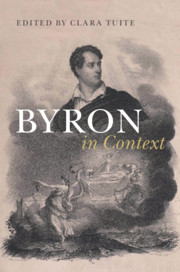Book contents
- Byron in Context
- Byron in Context
- Copyright page
- Dedication
- Contents
- Illustrations
- Contributors
- Chronology
- Abbreviations and Note on the Text
- Introduction
- Part I Life and Works
- Part II Political, Social and Intellectual Transformations
- Part III Literary Cultures
- Part IV Reception and Afterlives
- Chapter 31 Contemporary Critical Reception to 1824
- Chapter 32 Byron, Radicals and Reformers
- Chapter 33 European Reception
- Chapter 34 Recollections, Conversations and Biographies
- Chapter 35 Posthumous Reception and Reinvention to 1900
- Chapter 36 Popular Culture
- Chapter 37 Byron Now
- Further Reading
- Index
Chapter 34 - Recollections, Conversations and Biographies
from Part IV - Reception and Afterlives
Published online by Cambridge University Press: 04 October 2019
- Byron in Context
- Byron in Context
- Copyright page
- Dedication
- Contents
- Illustrations
- Contributors
- Chronology
- Abbreviations and Note on the Text
- Introduction
- Part I Life and Works
- Part II Political, Social and Intellectual Transformations
- Part III Literary Cultures
- Part IV Reception and Afterlives
- Chapter 31 Contemporary Critical Reception to 1824
- Chapter 32 Byron, Radicals and Reformers
- Chapter 33 European Reception
- Chapter 34 Recollections, Conversations and Biographies
- Chapter 35 Posthumous Reception and Reinvention to 1900
- Chapter 36 Popular Culture
- Chapter 37 Byron Now
- Further Reading
- Index
Summary
The many thousands of pages of biography devoted to Byron in the decades following his death formed the most substantial embodiment of his evolving cultural presence through the nineteenth century. Biographical narratives, often in the form of “recollections” or “conversations,” picked up on the critical debates surrounding Byron’s poetry in his lifetime and applied them to his behavior as a man. They included eyewitness accounts, letters and other documents that still inform biography and scholarship today. The story of Byron’s biographies is one of passionate factionalism and conflicting vested interests, reflecting the extreme feelings he provoked, focused on contentious issues of class, gender, sexuality and religion. For all these reasons and more, the biographical literature is indispensable for understanding Byron and Byronism.
- Type
- Chapter
- Information
- Byron in Context , pp. 281 - 288Publisher: Cambridge University PressPrint publication year: 2019

